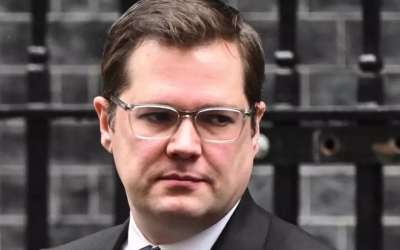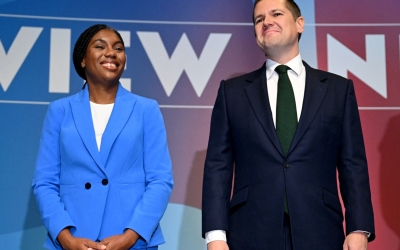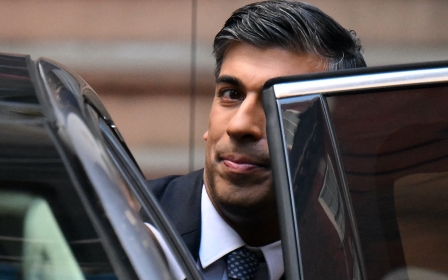UK: How Trump's return offers a way back to power for the far right

There is one British winner from the US presidential election results: leader of the Reform party Nigel Farage; and one loser: Prime Minister Keir Starmer. And perhaps one joker: former Prime Minister Boris Johnson.
American politics, history proves, drives events in Britain. Think Margaret Thatcher and Ronald Reagan, George Bush senior and John Major, Bill Clinton and Tony Blair.
Now Donald Trump, probably the most right-wing US president in the country’s history, stands poised to enter the White House again.
Authoritarians and fascists are celebrating his victory: Narendra Modi in India, Benjamin Netanyahu in Israel, Vladimir Putin in Russia, and Geert Wilders in Holland, who said: "Congratulations America! Never stop. Always keep fighting!"
Hungary’s Prime Minister Victor Orban described Trump re-election as "a much-needed victory for the world", while Italian Prime Minister Giorgia Meloni said: "Good job, Mr President."
New MEE newsletter: Jerusalem Dispatch
Sign up to get the latest insights and analysis on Israel-Palestine, alongside Turkey Unpacked and other MEE newsletters
A warped understanding
In Britain, Farage is Trump’s closest follower. Trump knows and likes Farage, who projects his brand of populist, oligarchical, far-right politics.
Farage whispers in the president’s ear. Far more than any other Briton, he shapes Trump’s warped understanding of the United Kingdom.
Both men have risen to the top by exploiting hatred, division and fear of mass immigration.
Until this week, Farage’s political career seemed to be floundering with Starmer’s Labour Party installed in power after July’s election landslide.
He has looked like a fish out of water in the House of Commons as MP for Clacton. With Trump in the White House, Farage will know that he can turn into a man of destiny once again.
You only need to look at Britain’s billionaire-owned popular press to see why. The Murdoch-owned press, the Rothermere empire and the Telegraph group, which between them account for an estimated three quarters of newspaper readers, are all celebrating Trump’s victory, while mocking his Democrat opponents.
The Sun hands two pages to the far-right polemicist and virulent Islamophobe Douglas Murray praising Trump for his war on immigration. Murray has also issued a photograph of himself apparently conferring with Trump at an "historic evening yesterday at Mar-a-Lago".
Farage is part of this. He has a front-page article in The Daily Telegraph calling on Britain to "roll out the red carpet" for Trump. The Mail devotes a page to call for Farage to be made Britain’s US ambassador.
With Trump in the White House, Farage is likely now to turn his attention - and will now seek - to complete his final political project: the destruction of the traditional Conservative Party and its replacement with a domesticated version of Trump’s Republicans.
That means uniting his Reform political movement with Kemi Badenoch’s gravely weakened Conservatives.
Racists and bigots
Many were already arguing before Britain’s July election that Reform and the Conservatives must come together. The argument was at first sight compelling.
Reform and the Tories occupy the same political space. Separately they cut each other's throats. United - in theory at least - they could amass enough votes to sweep to power at the next general election.
There are several obstacles. At the last election many Reform party candidates - let alone the voters - were exposed as racists and bigots.
For politicians like Farage, Truss and Rees-Mog, Trump offers a way back to power for the Tory Party in the wake of its electoral catastrophe last July
More than that, Tory leader Badenoch and other senior Tories so far refuse to contemplate leaving the European Court of Human Rights, seen by the Trump-Farage right as a crucial obstacle to confronting mass immigration into the United Kingdom.
We can be certain, however, that in the wake Trump’s election triumph many on the right of British politics will be turning their attention to emulating his US victory and securing the merger of Reform and the Conservatives.
Remember that Farage was not the only Trump supporter ahead of this week’s US elections. So was Boris Johnson, another Trump fanboy. So, too, is another former prime minister, Liz Truss, and former Tory MP Jacob Rees-Mogg.
For these politicians, Trump offers a way back to power for the Tory Party in the wake of its electoral catastrophe last July.
This means doing to the Conservative Party what Trump did to the Republicans - exploiting the historic name of a famous political party as a vehicle for the promotion of a far-right movement.
There is one remaining problem.
Trump is not remotely a Conservative. The charge of fascism has often been abused by left-wing politicians keen to denigrate right-wing opponents. But Trump is indeed a contemporary fascist in his demands for adulation, and his determination to place all the institutions of the state in the hands of loyalists.
A frightening moment
A fascist who, like his historic predecessors, parasites on religion and steals the authority of God.
Bear in mind that tolerance of street violence - as Trump plainly did over the Capitol Hill riots and in repeated statements before and since - is a core indicator of fascism. It is also a repudiation of everything that Conservatism stands for.
Bear in mind that like his fascist predecessors, Trump has turned not only on socialists and liberals, but also on conservatives who welcomed him and thought he was one of them.
He is also a fascist in his contempt for minorities. Trump's victory is in particular a frightening moment for British Muslims.
Bear in mind finally that Trump is a misogynist, bigot and convicted felon, found guilty on 34 counts of falsifying business records. This criminal record has not deterred two British former prime ministers from supporting him.
Worship of power for its own sake is another mark of fascism. For Johnson, Truss, Rees-Mogg and others, Trump offers a kind of political salvation.
For this reason much depends on how Starmer deals with the return of Trump. Many of his advisers will want him to maintain Britain’s "special relationship" and maintain close links to the White House.
Of course Britain cannot avoid doing business with the United States. Yet Trump's return is not a matter of celebration.
Anyone who believes in the values of liberal democracy, let alone a Labour prime minister, must stand up to Trump's British sycophants. Doing so would give direction and moral purpose to the Starmer premiership, something it badly needs.
One final thought. Trump will be president when the United States celebrates the 250th anniversary of the Declaration of Independence on 4 July 2026.
Trump personally represents the death knell for the immutable principles which inspired that document. This is a terrible moment in world history.
The views expressed in this article belong to the author and do not necessarily reflect the editorial policy of Middle East Eye.
Middle East Eye delivers independent and unrivalled coverage and analysis of the Middle East, North Africa and beyond. To learn more about republishing this content and the associated fees, please fill out this form. More about MEE can be found here.







